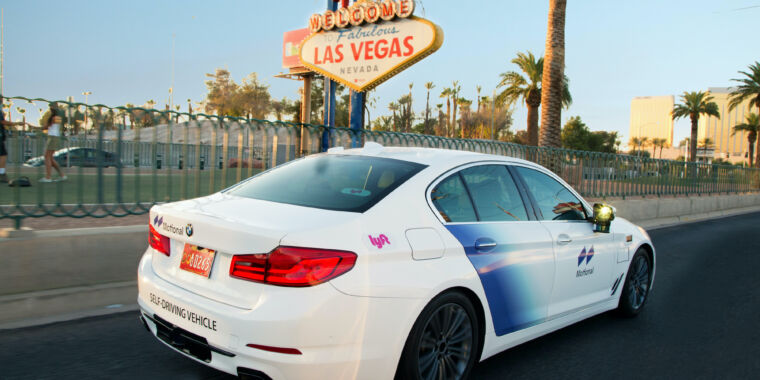
Motional
Motional, a Hyundai joint venture with automotive parts giant Aptiv, began testing its autonomous vehicles in Las Vegas with no one behind the wheel, the company announced in a blog on Monday.
Motional is not yet ready to launch a driverless commercial service. But Motional – which was part of Aptiv before Hyundai’s investment – has operated a commercial autonomous taxi service (with security drivers) for several years. The service is operated in partnership with Lyft; Lyft customers in Las Vegas can choose to ride in a Motional car during some of their trips. Motional says its vehicles have completed more than 100,000 trips without causing an accident.
Motional says it has hired German test company TÜV SÜD to examine its autonomous driving technology. After an 18-month review process, the company endorsed the technology for driverless testing.
Motional is following in the footsteps of Cruise, a joint venture between GM and Honda, which announced the start of driverless testing in San Francisco in December. Market leader Waymo has operated a driverless commercial service in the Phoenix area since last October.
As Waymo’s driverless service is open to the public, we can get a very accurate idea of its performance. The first analyzes were very good. A college student who took more than 60 trips described it as “rock solid”.
On the other hand, it is difficult to know how significant it is when a company like Cruise or Motional announces the start of driverless testing. Both companies continued to keep someone in the passenger seat with the ability to cancel a trip, if necessary. Both companies also limited the scope of the tests. According to Verge, the company’s initial tests are limited to daytime hours and residential areas.
In fact, this may not be much different from the early days of Waymo’s driverless testing activities. Waymo announced the start of driverless testing in November 2017, but a large fraction of its vehicles continued to have safety drivers until the coronavirus pandemic struck in March 2020. It was only in late 2020, after almost three years tests, that Waymo finally started offering driverless commercial tours.
Motional seems to have a similar schedule. The company’s goal is to launch a driverless commercial service in 2023, giving the company nearly three years to perfect the technology before offering it to the public on a large scale.
By the end of the 2010s, it was common to predict that driverless technology would be widely available in early 2020. We now know that this was overly optimistic. But recently the pendulum has swung in the opposite direction, with people wondering whether fully driverless technology could still be many years, or even decades, away.
This seems like an overreaction. At least seven major self-directed projects – Waymo, Motional, Cruise, Ford’s Argo, Amazon’s Zoox, Intel’s Mobileye and startup Aurora – now appear to be within walking distance of completely driverless operations. Chinese companies have also started to test driverless technology. No one knows exactly how long it will take to bring this technology to market, but there is every reason to expect the technology to become widely available to the public during this decade.
